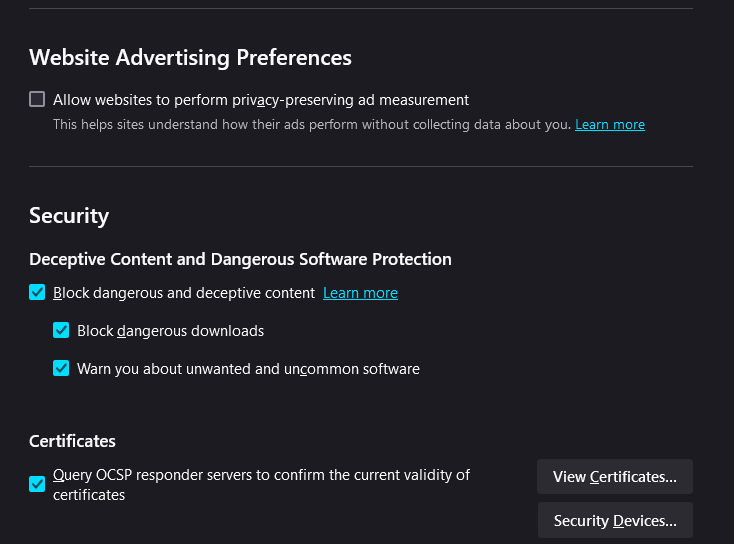i don’t wanna see another ad on the web in my life, so i’ll just keep on using ublock.
Yeah pretty much. The privacy invasion of ad companies is terrible for sure, but the whole seeing ads all over the damn place in the first place is also annoying enough that even if they were somehow completely tracker-free I would still block them.
Not only do I not want them looking at me, but I do not want to be made to look at them! Since when does someone else’s money mean I have to have them in my life?
I said this in the other thread but it bears repeating.
Data-driven marketing and privacy are diametrically opposed.
If I want to advertise to pregnant teenagers looking at bus tickets, even if I have something helpful to say, that is a huge privacy violation to those people. And even if you say, I can’t see who’s being advertised to, I can see who clicks on the ads, even accidentally. Now I know a whole lot about them
I can see who clicks on the ads
Any privacy-focused advertisement program needs to prevent this. Clicking on privacy-oriented ads should be handled locally and anonymous statistics sent to Mozilla for revenue collection. There should be zero way to connect my identity with any interaction with ads.
If they can manage that, I’ll disable my ad-blocking on those sites that opt-in. But I’m not giving up any of my metadata. My metadata stays on my machine, so if they want to advertise to me, they need to abide by that.
I’m not sure how that’s physically possible. Any data-driven marketing strategy that results in clicks, somebody just makes a very narrow campaign and then measures the clicks. Anybody who clicks matches the data targeting.
If the goal is to drive clicks, and not just like expose you to a logo passively, I don’t see how it’s physically possible to do anything else
Like this:
- Mozilla runs some algorithm to categorize browsing history
- Advertisers send an ad compaign to Mozilla targeting certain categories
- Firefox downloads those campaigns regularly and notifies websites that the client has opted-in to local ads
- Website doesn’t display ads, and Firefox replaces ad areas with locally-driven ads
- Any clicks/views are recorded locally and reported periodically to Mozilla in an anonymized fashion (e.g. distribution of categories among views and clicks, distribution across domains, etc); clicks open in a new tab with no tracking other than the ad image that was clicked (e.g. if it was a product, the server can redirect to that product page)
- Mozilla bills advertisers using click and view stats; advertisers only get summarized, aggregated data
That’s what I thought Brave was promising, and that’s what I hope Mozilla is planning. I doubt Mozilla will deliver, but hope springs eternal. If anyone can do it, it’s Mozilla, I just doubt they will.
5 is the problem. If you click through to anything, the person who gets the clicks knows what campaign you came from.
Sure, but that wouldn’t identify you, and that’s the important part. And they’d only know that if you actually click. I guess they could try the fingerprinting route, but Mozilla could also make strict policies that any company caught doing that would have their ad agreement rescinded.
I doubt ad companies would get on board with that, but those are my requirements. I’m happy to look at ads, provided my privacy is maintained.
I’m not sure that’s true.
Advertisement campaign a, takes people to landing site b.
Anybody who shows up at site b, you know was targeted and campaign a.
And if you’re saying b is some generalized large domain, I promise you no advertiser would ever do that. They would set up subdomains, or campaign specific domains, any landing page where they know where you’re coming from. And there’s no way to stop them from doing that
At its core, most online advertising is just about a campaign to send people to a location. And if you can specify the campaign, and you can specify the location, you know which people came from that campaign and what they’re advertisement factors are
Advertisement campaign a, takes people to landing site b.
Mozilla would be in charge of how long campaigns run, and what types of URLs would be allowed. The alternative is those ads get blocked and the advertiser gets nothing.
So yeah, the advertiser could tell that a Firefox user visited a given link, but they couldn’t identify anything in particular about that user, other than their search history matched one of the criteria for the campaign.
That’s honestly pretty acceptable. Other advertisers know the site the ad was served on, cookies from that site, potentially a nonce per user, etc. This method strips most of that, and only lets them know that it was a Firefox user during a given campaign. Mozilla could do audits to check if they’re doing anything more to fingerprint users, and if so, drop the advertiser.
If those users would otherwise block ads, theoretically those advertisements are more valuable because those users are much harder to target. So advertisers may be willing to compromise here, since the alternative is no revenue. Mozilla would share revenue with sites, so there’s an incentive for websites to opt-in as well.
That’s not how ads work
It’s how they should work.
When I get an ad in the mail, the advertiser doesn’t know that I actually looked at it. When I grab a newspaper ad at the store, the advertiser doesn’t know that I did that unless I use a coupon or something.
That’s how I’d like online ads to work, but with a bit of targeting based on local-only data.
If they want me to look at ads, they’re going to need to respect my privacy. If not, I’m content leaving my ad-blocker enabled.
The whole point of targeted advertising is that you get to bid on people you want. You want a old fat guy in Oklahoma? Done You want to advertise gambling apps to people who have a history of gambling? Done.
That’s certainly true from Google’s or Meta’s perspective, but it wasn’t always that way.
I get ads in my mailbox that are completely irrelevant to me, like Medicare ads (probably for the previous owner). As a kid, I watched lots of ads on TV that definitely weren’t applicable to me (e.g. cutco knives, when I wasn’t old enough to use a knife). I see billboards on my way to work for debt relief (not in any debt, aside from mortgage) and addiction recovery (no addictions here). Companies pay quite a bit for those ads even if they won’t be relevant for most people because of the sheer reach of those ads.
I’m proposing a middleground. Ad companies don’t get as accurate of targeting for ads, but in exchange they get seen by people who would otherwise block them.
This sounds a whole lot like privacy sandbox.
You know, Google Topics.
The thing nobody wanted.And honestly, reading through the article here, I don’t see many ways that it’ll be much better. If advertisements are matched on your local machine, then data is still being amalgamated somewhere. This is similar to Google Topics and Microsoft Recall, two things people complain about. For good reason.
The online advertising industry is undergoing a significant transformation. With growing consumer concerns and increasing scrutiny from regulators, it’s evident that current data practices are excessive and unsustainable.
It’s strange that Mozilla, a company that constantly positions itself as the ethical alternative to big tech, is saying “companies are being mandated out of unethical advertising.”
Secure Environment: Data sets are matched in a highly secure environment
Without any further information, this means so very little. Is it done locally? On their servers? Who knows.
By combining Mozilla’s scale and trusted reputation with Anonym’s cutting-edge technology, we can enhance user privacy and advertising effectiveness, leveling the playing field for all stakeholders.
When advertising is the business, your attention is the product. Maybe I’m being too unkind to Mozilla here, but it’s their press release and they can be as specific as they choose.
Anonym was founded with two core beliefs: First, that people have a fundamental right to privacy in online interactions…
This is the sort of meaningless fluff that you see at the front of every privacy policy, including that of the most invasive companies.
… and second, that digital advertising is critical for the sustainability of free content, services and experiences.
That’s the only way to offer free services?! What about donation-based models? Maybe Mozilla could have set up something like what Brave has, except not based around a sketchy cryptocurrency.
In fact, GNU Taler exists for this very purpose.
Anonym was founded in 2022 by former Meta executives
Meta. The company known for loving user privacy.
I was hoping Mozilla would finally shut up about putting AI into everything, but in retrospect, maybe they should go back to that.
I’m reading through the Anonymco privacy policy. Some standouts:
We collect… IP address, social media user names, passwords and other security information,
Passwords?!
…your browsing and click history, including information about how you navigate within our Site and Services…
…We collect and verify resumes, employment eligibility, education, and employment history from job applicants. This includes information about your skills and qualifications for the position…
Okay, great, they know how employable you are
We may disclose Personal Information and any other information about you to government or law enforcement officials or private parties… to prevent or stop any illegal, unethical, or legally actionable activity…
They are leaving the door open to disclose your data to private mercenaries to prevent… Pre-crime, I think.
We use Google Analytics on the Site and Services to analyze how users use the Site and Services, and to provide advertisements to you on other websites.
THEY USE GOOGLE ON YOUR DATA.
This really sounds like Mozilla snapped up the first company with the right buzzwords that they could find, rather than looking for the best one. It sounds like a repeat of the OneRep privacy disaster, when they partnered with a corporation that sold people’s data and used their ownership of it to basically demand ransom payments for its removal.
Passwords?!
Yeah, that and usernames are a big nope from me.
I’m not opposed to the idea of privacy-oriented advertising, but it needs to be:
- local only - no service, including Mozilla, can correlate me to ads being shown; advertisers and Mozilla can only know broad stats
- opt-in - ideally it would replace ads on websites, not add ads, and ad-block should continue to be effective; I’m willing to disable ad-block if a site opts-in to privacy-friendly ads (my concern is tracking, I don’t mind them getting paid)
- auditable - I should be able to see why certain ads are being shown, and verify that none of that metadata leaves my computer
THEY USE GOOGLE ON YOUR DATA.
Again, big nope from me. I hope Mozilla significantly changes how they operate and only uses their talent to build something actually privacy-focused. That’s a pretty big ask, so I’m not optimistic.
My hopes are not high. Right before FakeSpot got bought out by Mozilla, they changed their privacy policy to add a “we will sell your data if we get bought out” clause.
(As a Mozilla product now, FakeSpot still retains private data and the right to sell it to advertising companies. So, at least to me, Mozilla has been an adtech company since 2023.)
They at least have good ad-block support, so I’ll continue using them as long as there’s nothing better. I’ve switched my mobile browser to Mull, and I’ll switch my desktop browser to Mullvad Browser if I need to (it’s not in my Linux distro’s repos, and I’m lazy).
LibreWolf is pretty good too. It’s less like Tor than Mullvad Browser is, at least out of the box.
I use the Mullvad Browser flatpak, and it works like a charm. Also LibreWolf, love it.
It’s so much worse than I thought, and I already hated it.
For a company who has a whole schtick going where they read and critique other companies’ privacy policies, this is pretty ludicrous.
All I can do is tap on the little graphic I made from their last buyout (that literally made Mozilla into an data broker):

FakeSpot privacy lowlights (I can’t tell if the image is linking correctly)
The wing of Mozilla that puts out press releases about invasive car companies seems to have no influence on the wing of Mozilla acquiring and injecting random crap into Firefox.
Is it done locally? On their servers? Who knows.
You know it’s on their servers. 🙂 Otherwise they would be beating so much around the bush.
I am a little disgusted by this because now both major browser engines are being developed by an advertising company, creating more incentives for future web technologies that strengthen tracking and undermine ad blocking.
From what I understand, this is an anonymized targeted ad company. In other words, ads are still targeted to the individual user, it is just harder for the advertiser to track (or profile) an individual user. Are there any companies still doing untargeted ads, ads where the advertiser might pick what site their ad goes on but cannot target a specific user demographic?
That’s a really good point. I hadn’t put it together that all browsers are now advertising companies
I think the closest we currently see, are video sponsorships on platforms like YouTube, where the creator just reads an advertisement for their audience. If you see the video you see the ad read it’s not tailored at all. That is not individually targeted, but they’re definitely choosing the show based on the demographics the show has.
Stolen from r*ddit, this is what the option looks like in the config (already in beta/dev channel)

also stolen from r*ddit: “Anonym was founded in 2022 by former Meta executives Brad Smallwood and Graham Mudd.”
Librewolf is the new Firefox
Change my mind
I switched a few months back after using Firefox /w ArkenWolf for years.
It’s great having an out the box product I don’t have to immediately tweak settings or install 3rd party tweaks & plugins to have a decent experience with.
I wonder if the process is open source or we just take their word that it’s privacy preserving. Anyway, privacy is not the only problem with online advertising, so I’m not going to give up adblocking any time soon.
It’s just an advertising company that knows to throw in some buzzwords.
Anonym was founded in 2022 by former Meta executives […]. The company was backed by [various venture capital corporations and multiple] strategic individual investors.
For maximum humor, run the bullshit.js bookmarklet.
Wow, lots of red on that page using that bookmarklet…
Is there a way for one to use this on android FF?
Edit:
Found one. Bookmarking the following(got it from view-source:) worked:
javascript:(function(){var d=document,s=d.createElement('script');s.crossOrigin='anonymous';s.src='https://unpkg.com/@mourner/[email protected]/bullshit.js';d.body.appendChild(s);}())Websites that helped:
https://paul.kinlan.me/use-bookmarklets-on-chrome-on-android/
https://stackoverflow.com/questions/63614702/bookmarklet-functionality-missing-in-firefox-android#63620174
Thanks for sharing the linkYes, but it’s not very easy. I used ViolentMonkey with this userscript.
Edit: your method is really cool too
Great
I love how Mozilla seems to be trying so hard to kill itself. You don’t see Google marketing Chrome as the browser that serves you ads and sends back telemetry.
Not the first time Mozilla has done something like this. In 2017, Mozilla stealthily installed a tracking and advertising plugin called Cliqz on a small number of German user’s computers, which provided users with targeted ads, with very similar language to what Mozilla is currently trying to incorporate with Anonym.
Fun fact: Cliqz also developed a search engine, which later got purchased by Brave and renamed Brave Search.
Advertising can’t be privacy preserving. What gives advertisement value is the fact that it’s targeted.
Advertising signs next to a road are both targeted and privacy respecting, just like radio/tv.
They are worth nothing compared to targeted ads online that know your soul.
That’s a really good point.
However the company that Mozilla just purchased was about targeted advertisement campaigns… “data-driven advertisements”
Yeah I’m aware, I just reacted to the general statement about advertising that was untrue imho.
That’s not what digital advertising is though.
The person I reacted to didn’t talk about only digital advertising
Contextual ads can be privacy preserving. As in Netflix ads in a entertainment page. The problem is targeting the ad on people, and not on content.
for anybody that wants to disable it, go to the settings and search for “Allow websites to perform privacy-preserving ad measurement”
(or through the
dom.private-attribution.submission.enabledflag inabout:config)https://support.mozilla.org/en-US/kb/privacy-preserving-attribution
Bollocks
This is why i am not giving another penny to Mozilla ever again
i really wish i could donate to just firefox and not mozilla, I just want firefox to be better and not to spend money on all these weird things.
Don’t worry, they can make plenty of money off of you (stock settings of course)
JS compatible browsers that actually respect your privacy:
Mozilla is not your friend, and they’re not saving the web from Google
You forgot Librewolf and Waterfox
All that being said, if you don’t want to tweak Firefox with Arkenfox user.js (or tweak it yourself), and you can live with the fact that Librewolf makes these outgoing connections [to update uBlock Origin and its lists], Librewolf is currently one of the most privacy respecting browsers out there.
It’s in my “good enough for me” list because the alternative is dealing with Firefox myself
Yeah, no some guys blog stating his personal opinion is not evidence. We are just talking about things that are better than Firefox anyhow
It would be more useful if you had something more substantiative than “it’s a blog so it’s wrong”. Is there actually something in the article you take issue with?
They blog doesn’t give much of a reason of why it isn’t private. It feels more like “I don’t use this so you shouldn’t” mentality
How is Librewolf and Waterfox connecting to Amazon Cloudfront and a bunch of other domains on first boot and Waterfox having a sketchy privacy policy (article’s is out of date but the new one isn’t much better) a subjective opinion?
For one, Librewolf clearly states what it does on startup. It has to update ublock origin and other threat lists. That is better than having out of date protections is it not? Just because it connects doesn’t mean it sends much data. Things need to be hosted somewhere.
For Waterfox the argument is less bad but Waterfox is about on par with a lot of other stuff. It isn’t going to be crazy good and it is no where near as good as Librewolf but it is better than Firefox and many others. I would rate it as half bad.
Librewolf is the arguably best privacy browser. You haven’t named anything better. It breaks sites occasionally but it does protect privacy and security and scores well on fingerprinting resistance.
Personally I disagree with the conclusions stated by the blog post, but I can respect the reasoning for getting there, and I can draw my own conclusions from it myself.
Terrible news
good cop bad cop
bad cop worse cop












